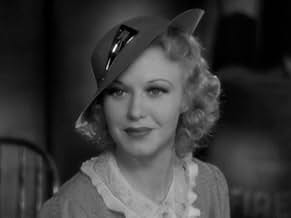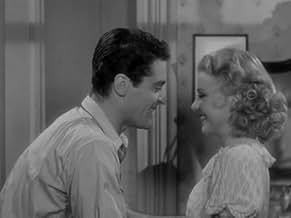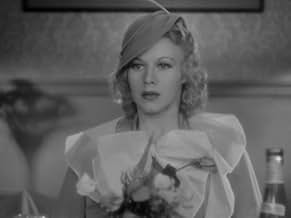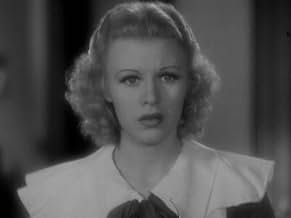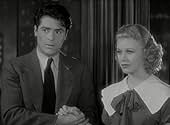Aggiungi una trama nella tua linguaRejected as an immigrant because he doesn't have the required $200, a Czech immigrant jumps ship and is befriended by a chorus girl and becomes a taxi driver.Rejected as an immigrant because he doesn't have the required $200, a Czech immigrant jumps ship and is befriended by a chorus girl and becomes a taxi driver.Rejected as an immigrant because he doesn't have the required $200, a Czech immigrant jumps ship and is befriended by a chorus girl and becomes a taxi driver.
- Regia
- Sceneggiatura
- Star
- Premi
- 2 vittorie totali
Richard Alexander
- Man at East River
- (non citato nei titoli originali)
Irving Bacon
- Counterman
- (non citato nei titoli originali)
Wade Boteler
- Customs Inspector
- (non citato nei titoli originali)
A.S. 'Pop' Byron
- Policeman Writing Down Charges
- (non citato nei titoli originali)
Spencer Charters
- Marriage License Clerk
- (non citato nei titoli originali)
Martin Cichy
- Policeman at Bar
- (non citato nei titoli originali)
Recensioni in evidenza
Honestly, I never really cared for the roles Francis Lederer played, until I watched this film. He is just perfect as the optimistic Czech immigrant, Karel Novak, who is so glad to be landing in America. The Great Depression doesn't scare him, he's willing to do anything and figures he can triumph over any adversity. Fate is about to hand him that chance as he faces just about every adversity an immigrant can face. First he arrives in New York with less than the money required to get in - he thought it was fifty dollars, instead it is two hundred. Instead of being deported, he jumps out of the window of the cabin he is confined in and gets ashore before he can be discovered missing.
Hungry and broke, Karel is befriended by chorine Sylvia (Ginger Rogers), when she spots him chowing down on the donuts and coffee that she and the other girls in the show were breakfasting on. Although not dismal, Sylvia is realistic about how hard times are. An orphan and only 19 herself, Sylvia is taking care of a younger brother, Frank, who is going to be put in an orphanage if he skips school again. Frank is not skipping school to hang out with some local gang though, he just wants to work selling more papers to help out his big sister whom he can see is working so hard to support them both. Karel helps Sylvia see life a bit differently, through the eyes of an immigrant who is so happy to be in bustling New York where he believes anybody can become a millionaire.
So Frank, Sylvia, and Karel become a real threesome. Karel sells papers during the day, then gets a job as a taxi driver, and things are looking up. He's hoping to get the two hundred dollars together to give the immigration people before they catch up to him, and his bank balance is rising. But then everything begins to go wrong. There is a taxi strike and Karel is forced off the job with no pay while the strike drags on. The show Sylvia was dancing in closes, and Karel offers to help out and plunders his entire bank account covering living costs. Finally, Frank skips school AGAIN to sell papers and help out, but this time he is going to be sent to the orphanage. Worst of all a crooked lawyer plays on Karel's lack of knowledge of the law and sells out Karel to the immigration people, so he is facing deportation again.
So how is this not the most depressing film ever? Because it is a love story - that of two people trying to make it in New York in slim times - Karel and Sylvia - slowly and convincingly falling in love and having great chemistry together. It's also the story of an unconventional family unit of three - Karel, Sylvia, and Frank - who would do anything for one another. I'll let you watch and see how this all works out.
It's a heartwarming tale of a different New York from decades ago - one full of boarding houses, cops on the beat who knew everyone in the neighborhood, when donuts and coffee were considered a hearty breakfast, and people largely had good intentions. It's one of my sentimental favorites.
Hungry and broke, Karel is befriended by chorine Sylvia (Ginger Rogers), when she spots him chowing down on the donuts and coffee that she and the other girls in the show were breakfasting on. Although not dismal, Sylvia is realistic about how hard times are. An orphan and only 19 herself, Sylvia is taking care of a younger brother, Frank, who is going to be put in an orphanage if he skips school again. Frank is not skipping school to hang out with some local gang though, he just wants to work selling more papers to help out his big sister whom he can see is working so hard to support them both. Karel helps Sylvia see life a bit differently, through the eyes of an immigrant who is so happy to be in bustling New York where he believes anybody can become a millionaire.
So Frank, Sylvia, and Karel become a real threesome. Karel sells papers during the day, then gets a job as a taxi driver, and things are looking up. He's hoping to get the two hundred dollars together to give the immigration people before they catch up to him, and his bank balance is rising. But then everything begins to go wrong. There is a taxi strike and Karel is forced off the job with no pay while the strike drags on. The show Sylvia was dancing in closes, and Karel offers to help out and plunders his entire bank account covering living costs. Finally, Frank skips school AGAIN to sell papers and help out, but this time he is going to be sent to the orphanage. Worst of all a crooked lawyer plays on Karel's lack of knowledge of the law and sells out Karel to the immigration people, so he is facing deportation again.
So how is this not the most depressing film ever? Because it is a love story - that of two people trying to make it in New York in slim times - Karel and Sylvia - slowly and convincingly falling in love and having great chemistry together. It's also the story of an unconventional family unit of three - Karel, Sylvia, and Frank - who would do anything for one another. I'll let you watch and see how this all works out.
It's a heartwarming tale of a different New York from decades ago - one full of boarding houses, cops on the beat who knew everyone in the neighborhood, when donuts and coffee were considered a hearty breakfast, and people largely had good intentions. It's one of my sentimental favorites.
A couple of funny comments and one humorous scene at the end do not a comedy make. Especially when it has so many elements of drama - an illegal immigrant escaping, jobless and hungry people, a city strike and some violence, a villainous lawyer, school truancy, and placement in an orphanage. No, "Romance in Manhattan" is not a comedy romance, but a drama with romance. And not so much romance, as respectful love. The sacrificial kind, as well.
Francis Lederer stars as Karel Novak, an immigrant from Czechoslovakia who must be returned to Europe because he didn't have the increased amount of money for immigration. It had jumped from $50 to $200. Distraught and knowing the hardship and time it would take to raise the money working in Europe, he jumps ship as it's leaving New York.
The rest of this film is the story of an immigrant trying to make it in the U.S. And, perhaps typical of European immigrants who had such positive outlooks and attitudes when coming to America. Only those who had endured the struggles most of them had in their home lands could comprehend their joy and happiness even with hardships in America.
Novak meets Sylvia Dennis (played by Ginger Rogers), who is herself struggling and trying to make it as an actress. She is just 19 and has been taking care of a younger brother, Frank, who is around 12. This is a good story about decency among people, hard work, sacrifice and friendship. It also shows some hard sides of humanity - a glimpse of violence from a labor strike, and a shyster lawyer. The New York City police are seen in a good light as compassionate as well as sticking to duty. J. Farrell MacDonald, as Officer Murphy, befriends Karel, Sylvia and Frank. Perhaps the experience of many Irish facing antagonism when immigrating to the U.S. tempered Murphy and some others.
Anyway goodness and kindness win out in the end. This is a good film that portrays an aspect of American life that was common for many people in the early decades of the 20th century. Younger audiences well into the 21st century who aren't inclined toward history will likely be bored.
Here are a couple of favorite lines from the film.
Karel Novak, "This house is so elegant. You have carpet, really." Sylvia Dennis, "Yes, and cockroaches too." Novak, "Cockroaches! Isn't it wonderful."
Sylvia Dennis, "Frank, did you ever stop to think what a wonderful place New York is?" Frank Dennis, "Sure - ain't we got the Giants and the Yanks?"
Francis Lederer stars as Karel Novak, an immigrant from Czechoslovakia who must be returned to Europe because he didn't have the increased amount of money for immigration. It had jumped from $50 to $200. Distraught and knowing the hardship and time it would take to raise the money working in Europe, he jumps ship as it's leaving New York.
The rest of this film is the story of an immigrant trying to make it in the U.S. And, perhaps typical of European immigrants who had such positive outlooks and attitudes when coming to America. Only those who had endured the struggles most of them had in their home lands could comprehend their joy and happiness even with hardships in America.
Novak meets Sylvia Dennis (played by Ginger Rogers), who is herself struggling and trying to make it as an actress. She is just 19 and has been taking care of a younger brother, Frank, who is around 12. This is a good story about decency among people, hard work, sacrifice and friendship. It also shows some hard sides of humanity - a glimpse of violence from a labor strike, and a shyster lawyer. The New York City police are seen in a good light as compassionate as well as sticking to duty. J. Farrell MacDonald, as Officer Murphy, befriends Karel, Sylvia and Frank. Perhaps the experience of many Irish facing antagonism when immigrating to the U.S. tempered Murphy and some others.
Anyway goodness and kindness win out in the end. This is a good film that portrays an aspect of American life that was common for many people in the early decades of the 20th century. Younger audiences well into the 21st century who aren't inclined toward history will likely be bored.
Here are a couple of favorite lines from the film.
Karel Novak, "This house is so elegant. You have carpet, really." Sylvia Dennis, "Yes, and cockroaches too." Novak, "Cockroaches! Isn't it wonderful."
Sylvia Dennis, "Frank, did you ever stop to think what a wonderful place New York is?" Frank Dennis, "Sure - ain't we got the Giants and the Yanks?"
Ginger Rogers and Francis Lederer have "Romance in Manhattan" in this 1935 film directed by Stephen Roberts. The movie also features Jimmy Butler, Sidney Toler, and Donald Meek.
The handsome Lederer plays Karel Novak, an immigrant to the U.S. who is sent back as soon as he arrives because he doesn't have the required $200. He thought he only needed $50. On the return ship to his native Czechoslovakia, he jumps ship, but loses his wallet in the process. Fortunately he meets a chorus girl, Sylvia, when he's trying to steal food. He winds up sleeping on the roof of the apartment building where Sylvia lives with her brother Frankie (Butler). Frankie helps Karel get a job delivering newspapers. Later on, Karel becomes a cab driver, all with the goal of earning the necessary $200 so he can stay in America.
What a wonderful movie, very heartwarming, with fine performances, especially by Lederer. Irving Thalberg intended to make Lederer a huge star in the U.S., but he died, and it didn't happen. Nevertheless, the European star made some fine films both in Europe and here, moved into television, started an acting school, and taught acting until he died at age 100. When he worked with Louise Brooks in Die Büchse der Pandora in 1929, he knew no English, and Brooks knew no German. Here he gives a witty, charming and sincere performance as Karel.
Ginger Rogers looks beautiful as Sylvia - she was 24 - and gives an excellent performance, sharing good chemistry with both Lederer and Butler.
Very sweet film, well directed, not cloying or overly sentimental. Loved it.
The handsome Lederer plays Karel Novak, an immigrant to the U.S. who is sent back as soon as he arrives because he doesn't have the required $200. He thought he only needed $50. On the return ship to his native Czechoslovakia, he jumps ship, but loses his wallet in the process. Fortunately he meets a chorus girl, Sylvia, when he's trying to steal food. He winds up sleeping on the roof of the apartment building where Sylvia lives with her brother Frankie (Butler). Frankie helps Karel get a job delivering newspapers. Later on, Karel becomes a cab driver, all with the goal of earning the necessary $200 so he can stay in America.
What a wonderful movie, very heartwarming, with fine performances, especially by Lederer. Irving Thalberg intended to make Lederer a huge star in the U.S., but he died, and it didn't happen. Nevertheless, the European star made some fine films both in Europe and here, moved into television, started an acting school, and taught acting until he died at age 100. When he worked with Louise Brooks in Die Büchse der Pandora in 1929, he knew no English, and Brooks knew no German. Here he gives a witty, charming and sincere performance as Karel.
Ginger Rogers looks beautiful as Sylvia - she was 24 - and gives an excellent performance, sharing good chemistry with both Lederer and Butler.
Very sweet film, well directed, not cloying or overly sentimental. Loved it.
This delightful work details the struggle of a Czech illegal immigrant, Karel Novak (Francis Lederer), to remain in the United States during the Depression, with a sparkling script limning the cultural impact of New York City upon the newcomer. Stephen Roberts directs with his customary skill in one of his final films (he died shortly after at the age of 40) and avoids both the hyperbolic and hypocritical, particularly significant when we are given the insincerity which marks the current immigration debate with its rough moral equivalence. The Bohemian-born Lederer's strong performance is quite probably his best, with an excellent and witty scenario providing the cast, which includes many of RKO's many contract players, an opportunity to create characterizations that are well-defined. Ginger Rogers nicely portrays Lederer's love interest and there is excellent acting from Sidney Toler and J. Farrell MacDonald as two of a contingent of New York's Finest (all Irish, of course) whose assistance is crucial to the process of bringing the complicated events to a suitable climax. Superlative editing by Jack Hively must be recognized as must the top-flight camera-work of Nick Musuraca, each contributing mightily to a film which should be better known.
A sensitive and skillful performance by Francis Lederer makes this minor film enjoyable enough to sit through. He plays a Czech immigrant who escapes deportation back to his native land by jumping ship, ending up penniless but full of spirit on the bustling streets of New York City. Soon he encounters a kindly chorus girl (Ginger Rogers) who takes him home and with the help of her 11-year-old brother helps him find work. The dialogue is peppered with lines about the state of the economy in 1934, an understanding of how difficult it was to find a job and even wry commentary on New Deal federal policies (someone on the writing team had to have been a Republican). Otherwise, the impact thins as the plot thickens. We are supposed to believe, in line with the moral code of movies at that time, that Lederer willingly agrees to sleep on the roof of Rogers's apartment building for months, coming inside to the stairs only when it rains. Somehow the summery weather never seems to change even though a significant stretch of time evidently passes during which he rises from newspaper seller to taxi driver (even "scabbing" during a strike), sporting an ever-improving wardrobe, savings account and self-confidence. To top it all off, he is helped out of legal snags relating to his immigration status (and marriage to Rogers) by the convenient fact that Rogers just happens to be very good friends with a sweet Irish cop who has connections in the municipal power structure; call it corruption for good ends.
Lederer's progress through the streets of New York City is represented by crudely staged actions in front of rear projections. Interior scenes, however, are handled imaginatively and catch the eye. Ginger Rogers is only secondary here, but when you see how many films she cranked out during this period, you have to allow her some slack. Lederer gets top billing and deserves it.
Lederer's progress through the streets of New York City is represented by crudely staged actions in front of rear projections. Interior scenes, however, are handled imaginatively and catch the eye. Ginger Rogers is only secondary here, but when you see how many films she cranked out during this period, you have to allow her some slack. Lederer gets top billing and deserves it.
Lo sapevi?
- QuizGinger Rogers's character in the film is 19 years old. Actually, at the time, she was 23 years old.
- BlooperAt the 01:11:20 mark the shadow of the boom mic can be seen moving on the wall behind the man on the phone.
- Citazioni
Karel Novak: [Enthusiastically] Smell the river!
Sylvia Dennis: [Sarcastically] You take another deep breath like that, and you'll kill yourself.
- ConnessioniReferences Follow the Leader (1930)
- Colonne sonoreAfter You've Gone
(1918) (uncredited)
Music by Turner Layton and Henry Creamer
Background music at the theater
I più visti
Accedi per valutare e creare un elenco di titoli salvati per ottenere consigli personalizzati
Dettagli
- Data di uscita
- Paese di origine
- Lingue
- Celebre anche come
- El embrujo de Manhattan
- Luoghi delle riprese
- Azienda produttrice
- Vedi altri crediti dell’azienda su IMDbPro
- Tempo di esecuzione
- 1h 17min(77 min)
- Colore
- Proporzioni
- 1.37 : 1
Contribuisci a questa pagina
Suggerisci una modifica o aggiungi i contenuti mancanti


